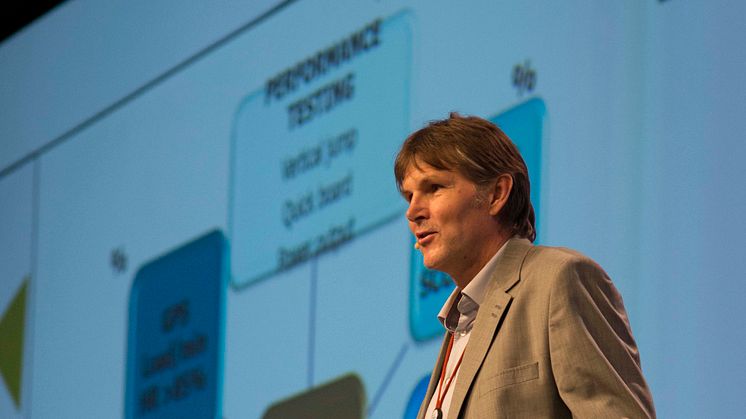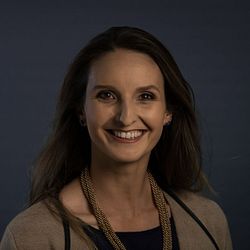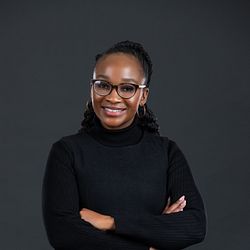
Press release -
Putting sports science into one hundredth of a second at Vitality Summit
At the elite level, it’s typical for winning athletes to be only one hundredth of a second faster than their competitors, sports scientist Dr Ross Tucker told delegates at the 2014 Discovery Vitality Summit in Sandton on Friday.
Sports science operates in that tiny, hundredth-of-a-second gap separating the winners and the losers. “The smaller the gap, the more stuff you can fit into it,” he said.
Tucker discussed several reasons for the continuing improvement in sports performance at the elite level. Compared to the early years of the twentieth century, more people are now exposed to sport, and the commercial pull of the big marathons has enticed more people – for instance from East Africa – to participate. He agreed there may also be some genetic factors driving Kenya’s success in long-distance running, which although not confined to Kenya, may be more predominant there.
“We’re starting to understand how we can change the environment young athletes are exposed to,” said Tucker, adding that sports science was contributing to testing and monitoring, so that “just the right dose” was given at the right time for the right athlete, in order to avoid the risk of overtraining.
“When you understand that one one-thousandth of a second can determine four years of hard work, the science matters,” he said, “but we over-estimate how much it matters.” Science could offer marginal gains and incremental improvement, rather than revolutions.
“The most important thing you’re looking for is leverage. There’s an opportunity cost. You have to choose which intervention will be most effective.”
Unfortunately, the single biggest impact science has had on sport is in the arena of doping. In the 1960s, athletes began taking testosterone to enhance their performance, and in later decades, EPO – “the Lance Armstrong drug” was the substance of choice. These drugs have had enormous impact on performance, albeit unethical and illegal.
Of the top 20 best female performers in the women’s 800m, only one person was not suspected of taking drugs. Caster Semenya’s performance in Berlin in 2009, where she ran 1:55:47, would have put her on this list.
“If your name is on this list, people will be suspicious. You do not get on this list unless you dope,” Tucker said.
Technology could also offer leverage. In 1960, the tumble turn was introduced in swimming, leading to a dramatic improvement in the 100m freestyle world record. Yet the biggest impact was recorded in the 1970s when goggles were introduced, which allowed athletes to see the wall ahead and time their progress better.
Ultimately, he said, “We don’t know how much humans have changed as opposed to how much technology has changed.” Elite 1930s athlete Jesse Owens was probably only 0.1 second behind today’s super-athlete Usain Bolt once analysts corrected for the surface and equipment.
“We need a different understanding of science. Science is the ability to systematically and critically investigate a problem in order to solve it. We need commonsense in science,” he said. “You must be the scientist. Build the picture by understanding your own experiences and question your answers.”
Dr Craig Roberts from the Human Performance Institute in Durban said there was so much data available that it was easy to be overwhelmed. In his work with the Springboks he was looking for what made a difference, particularly to the injury rate.
Rugby players are over 10kg heavier than a decade ago and much faster, so collisions are bigger. At the end of a season, 70% of players are injured and 40% are playing through injuries. With high intensity training, of short duration, there are fewer injuries.
However, even at elite levels technology does not always provide the answers. The New York Knicks have developed an algorithm to show when players are likely to perform at their best. The most influential metric – rating of perceived exertion, or RPE – was weighted 30%, yet did not depend on technology. “That’s asking the athlete how hard the training session was. Even experienced coaches overestimate how hard the training session was,” he said.
By asking the athlete, and giving the coach the results, much better alignment resulted, he said.
Topics
Categories
Discovery information
About Discovery Limited
Discovery Limited is a South African-founded financial services organisation that operates in the healthcare, life assurance, short-term insurance, savings and investment products and wellness markets. Founded in 1992 by the current Group Chief Executive Officer Adrian Gore, Discovery was guided by a clear core purpose – to make people healthier and to enhance and protect their lives. Underpinning this core purpose is the belief that through innovation Discovery can be a powerful market disruptor.
The company, with headquarters in Johannesburg, South Africa, has expanded its operations globally and currently serves over seven million clients across South Africa, the United Kingdom, the United States, China and Singapore. Vitality, Discovery’s wellness programme, is the world’s largest scientific, incentive-based wellness solution for individuals and corporates. The global Vitality membership base now exceeds 5.5 million lives in five markets.
Discovery is an authorised financial services provider. It trades on the Johannesburg Securities Exchange under the code “DSY”.
Follow us on Twitter @Discovery_SA







